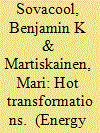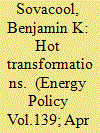|
|
|
Sort Order |
|
|
|
Items / Page
|
|
|
|
|
|
|
| Srl | Item |
| 1 |
ID:
176097


|
|
|
|
|
| Summary/Abstract |
Decarbonisation policies often emphasise the uptake of new end-use technologies, seeing people as consumers of technologies with predictable impacts. In the UK, smart hybrid heat pumps (SHHP) have attracted policy interest as a technology potentially offering multiple benefits for home heat decarbonisation. This paper draws on domestication theory, a perspective that frames people as users who actively learn about technologies, to analyse interviews and observations with installers and users involved in the first UK trial of SHHP. This perspective reveals that users’ learning about SHHPs may erode part of the energy savings they offer and have implications for future technology uptake, including the trajectories of heat decarbonisation currently envisaged by policy makers. However, it also reveals opportunities for policy making to influence user learning, including paying closer attention to material elements such as radiator controls and space to air laundry alongside improved information provision. This could be supported by engaging with users as their learning emerges over time. Overall, the paper highlights the policy relevance of technology use as well as uptake and adds to calls for energy policy to think beyond information provision and economic incentives to engage with households, implying a less deterministic approach to policy making.
|
|
|
|
|
|
|
|
|
|
|
|
|
|
|
|
| 2 |
ID:
176711


|
|
|
|
|
| Summary/Abstract |
The rapid decarbonisation of heat remains a challenging energy and climate policy priority. In this study, after screening 461 global case studies, we examine four national household transitions in heat, and examine their implications for governance. These transitions were both rapid, involving transformations in heat provision in a short timeframe of 18–35 years; and deep, involving diffusion that collectively reached more than 100 million households and more than 310 million people. From 1995 to 2015, China stimulated industrial research with strong municipal and national targets and policies to the point where they saw adoption rates for solar thermal systems surpass 95% market penetration in many urban areas. From 1976 to 2011, Denmark blended small-scale decentralized community control with national standards and policies to promote district heating so it reached 80% of household needs. From 2000 to 2018, Finland harnessed user and peer-to-peer learning, and innovation, alongside national and European policies and incentives so that heat pumps reached almost a third of all homes. From 1960 to 1977, The United Kingdom coordinated a nationalized Gas Council and Area Boards with industry groups, appliance manufacturers, installers and marketing campaigns so that gas central heating reached almost half of all homes. These four rapid case studies share commonalities in polycentric governance, rooted in (1) equity, (2) inclusivity, (3) information and innovation, (4) ownership and accountability, (5) organizational multiplicity, and (6) experimentation and flexibility. The study affirms that designing the right sort of political and governance architecture can be just as salient as technical innovation and development in stimulating transitions.
|
|
|
|
|
|
|
|
|
|
|
|
|
|
|
|
| 3 |
ID:
176712


|
|
|
|
|
| Summary/Abstract |
The rapid decarbonisation of heat remains a challenging energy and climate policy priority. In this study, after screening 461 global case studies, we examine four national household transitions in heat, and examine their implications for governance. These transitions were both rapid, involving transformations in heat provision in a short timeframe of 18–35 years; and deep, involving diffusion that collectively reached more than 100 million households and more than 310 million people. From 1995 to 2015, China stimulated industrial research with strong municipal and national targets and policies to the point where they saw adoption rates for solar thermal systems surpass 95% market penetration in many urban areas. From 1976 to 2011, Denmark blended small-scale decentralized community control with national standards and policies to promote district heating so it reached 80% of household needs. From 2000 to 2018, Finland harnessed user and peer-to-peer learning, and innovation, alongside national and European policies and incentives so that heat pumps reached almost a third of all homes. From 1960 to 1977, The United Kingdom coordinated a nationalized Gas Council and Area Boards with industry groups, appliance manufacturers, installers and marketing campaigns so that gas central heating reached almost half of all homes. These four rapid case studies share commonalities in polycentric governance, rooted in (1) equity, (2) inclusivity, (3) information and innovation, (4) ownership and accountability, (5) organizational multiplicity, and (6) experimentation and flexibility. The study affirms that designing the right sort of political and governance architecture can be just as salient as technical innovation and development in stimulating transitions.
|
|
|
|
|
|
|
|
|
|
|
|
|
|
|
|
|
|
|
|
|